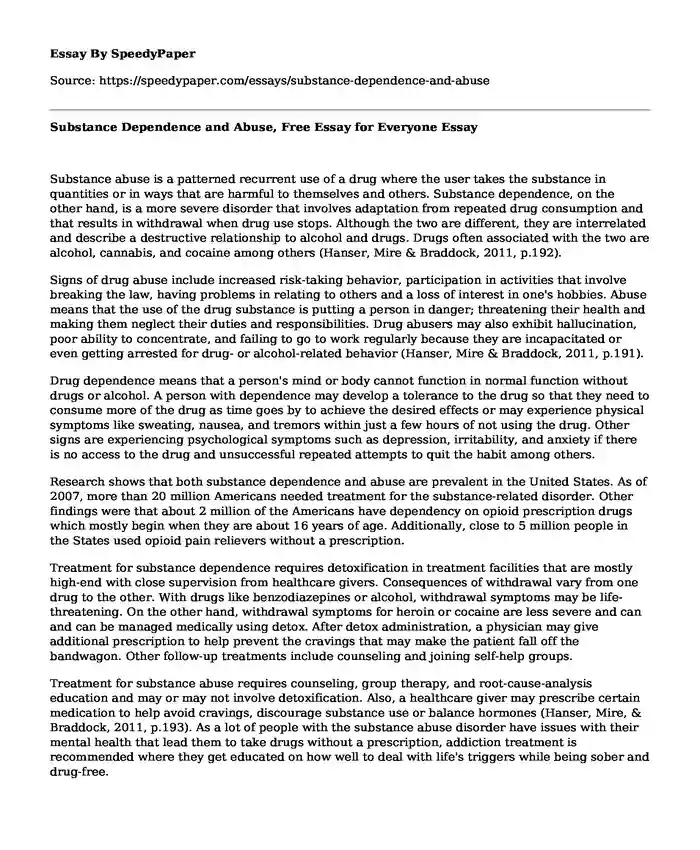
| Type of paper: | Term paper |
| Categories: | Counseling Substance abuse |
| Pages: | 3 |
| Wordcount: | 597 words |
Substance abuse is a patterned recurrent use of a drug where the user takes the substance in quantities or in ways that are harmful to themselves and others. Substance dependence, on the other hand, is a more severe disorder that involves adaptation from repeated drug consumption and that results in withdrawal when drug use stops. Although the two are different, they are interrelated and describe a destructive relationship to alcohol and drugs. Drugs often associated with the two are alcohol, cannabis, and cocaine among others (Hanser, Mire & Braddock, 2011, p.192).
Signs of drug abuse include increased risk-taking behavior, participation in activities that involve breaking the law, having problems in relating to others and a loss of interest in one's hobbies. Abuse means that the use of the drug substance is putting a person in danger; threatening their health and making them neglect their duties and responsibilities. Drug abusers may also exhibit hallucination, poor ability to concentrate, and failing to go to work regularly because they are incapacitated or even getting arrested for drug- or alcohol-related behavior (Hanser, Mire & Braddock, 2011, p.191).
Drug dependence means that a person's mind or body cannot function in normal function without drugs or alcohol. A person with dependence may develop a tolerance to the drug so that they need to consume more of the drug as time goes by to achieve the desired effects or may experience physical symptoms like sweating, nausea, and tremors within just a few hours of not using the drug. Other signs are experiencing psychological symptoms such as depression, irritability, and anxiety if there is no access to the drug and unsuccessful repeated attempts to quit the habit among others.
Research shows that both substance dependence and abuse are prevalent in the United States. As of 2007, more than 20 million Americans needed treatment for the substance-related disorder. Other findings were that about 2 million of the Americans have dependency on opioid prescription drugs which mostly begin when they are about 16 years of age. Additionally, close to 5 million people in the States used opioid pain relievers without a prescription.
Treatment for substance dependence requires detoxification in treatment facilities that are mostly high-end with close supervision from healthcare givers. Consequences of withdrawal vary from one drug to the other. With drugs like benzodiazepines or alcohol, withdrawal symptoms may be life-threatening. On the other hand, withdrawal symptoms for heroin or cocaine are less severe and can and can be managed medically using detox. After detox administration, a physician may give additional prescription to help prevent the cravings that may make the patient fall off the bandwagon. Other follow-up treatments include counseling and joining self-help groups.
Treatment for substance abuse requires counseling, group therapy, and root-cause-analysis education and may or may not involve detoxification. Also, a healthcare giver may prescribe certain medication to help avoid cravings, discourage substance use or balance hormones (Hanser, Mire, & Braddock, 2011, p.193). As a lot of people with the substance abuse disorder have issues with their mental health that lead them to take drugs without a prescription, addiction treatment is recommended where they get educated on how well to deal with life's triggers while being sober and drug-free.
Finally, both substance abuse and dependence are disorders that have dire consequences on their victims. The effects can range from behavioral change to worse cases like death. All hope is not lost as a considerable fraction of them can be treated with the right care and medication. That being the case, prevention is always better than cure.
Reference
Hanser, R. D., Mire, S. M., & Braddock, A. (2011). Correctional counseling. Pearson Higher Ed.
Cite this page
Substance Dependence and Abuse, Free Essay for Everyone. (2022, Mar 01). Retrieved from https://speedypaper.com/essays/substance-dependence-and-abuse
Request Removal
If you are the original author of this essay and no longer wish to have it published on the SpeedyPaper website, please click below to request its removal:
- Nursing Essay Sample: Middle Range Theories in Nursing Practice
- Teaching Critical Thinking - Freewriting Essay Example
- EBay Analysis, Business Essay Example
- Essay Sample: Market Research on Detergents
- Paper Example on the Four Stages of the Creative Process
- Paper Example: Why I Will Teach
- To the University College Absalon. Paper Example
Popular categories




